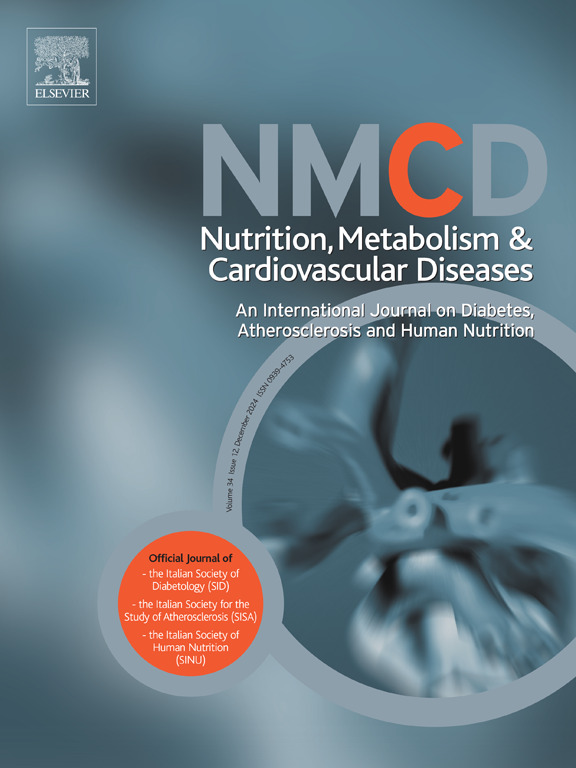Low-carbohydrate diet enriched with omega-3 and omega-9 fatty acids modulates inflammation and lipid metabolism in the liver and white adipose tissue of a mouse model of obesity
IF 3.3
3区 医学
Q2 CARDIAC & CARDIOVASCULAR SYSTEMS
Nutrition Metabolism and Cardiovascular Diseases
Pub Date : 2025-02-22
DOI:10.1016/j.numecd.2025.103932
引用次数: 0
Abstract
Background and aim
The low-carbohydrate high-fat (LCHF) diet lipids are often overlooked for obesity management. We hypothesized that unsaturated lipids enhance fatty acid metabolism, and influence obesity-related metainflammation.
Methods and results
Male Swiss mice were fed an obesity-inducing diet for ten weeks. Subsequently, the obese mice were divided into four groups, each receiving a LCHF diet enriched with different types of lipids: saturated fatty acids (SFA), polyunsaturated fatty acids (PUFA) ω-3, PUFA ω-6, and monounsaturated fatty acids (MUFA) ω-9 during six weeks as an obesity intervention. For comparison, a lean control (CTL) group and an obesity control (HFC) group were also included, spanning the entire 16-week experimental protocol. We evaluated body mass gain, fatty acid profiles via gas chromatography, elongase, and desaturase activities, NFκBp65 expression by western blotting, and cytokine by ELISA kits in serum, liver, and retroperitoneal adipose tissue (RET) samples. Our results highlight that ω-3 and ω-9 LCHF diets facilitate weight loss and enhance unsaturated fatty acid incorporation in liver, RET, and serum compared to the other groups. The ω-3 LCHF diet notably reduced the ω-6/ω-3 ratio and improved inflammatory status by reducing cytokines such as IL-4, IL-17, IL-33, CXCL1/KC, and inhibiting NFκBp65 activity compared to the HFC group. Desaturase (delta-9 desaturase-18, delta-6 desaturase) and elongase (ELOVL5 and ELOVL6) activities were modulated in liver, RET, and serum samples by ω-3 and ω-9 compared to the HFC group.
Conclusions
ω-3 and ω-9 fats were most effective in obesity treatment with the LCHF diet, highlighting the significance of lipid type in carbohydrate-restriction for obesity management.

富含omega-3和omega-9脂肪酸的低碳水化合物饮食调节肥胖小鼠模型肝脏和白色脂肪组织的炎症和脂质代谢。
背景与目的:低碳水化合物高脂肪(LCHF)饮食脂质在肥胖管理中经常被忽视。我们假设不饱和脂质促进脂肪酸代谢,并影响肥胖相关的元炎症。方法与结果:雄性瑞士小鼠喂食致肥饮食10周。随后,肥胖小鼠被分为四组,每组在六周内接受富含不同类型脂质的LCHF饮食:饱和脂肪酸(SFA)、多不饱和脂肪酸(PUFA) ω-3、PUFA ω-6和单不饱和脂肪酸(MUFA) ω-9,作为肥胖干预。为了进行比较,在整个16周的实验方案中,还包括瘦对照(CTL)组和肥胖对照(HFC)组。我们评估了血清、肝脏和腹膜后脂肪组织(RET)样本的体重增加、脂肪酸谱(气相色谱法)、延长酶和去饱和酶活性、NFκBp65表达(western blotting)和细胞因子(ELISA试剂盒)。我们的研究结果强调,与其他组相比,ω-3和ω-9 LCHF饮食有助于体重减轻,并增加肝脏、RET和血清中的不饱和脂肪酸掺入。与HFC组相比,ω-3 LCHF组通过降低IL-4、IL-17、IL-33、CXCL1/KC等细胞因子,抑制NFκBp65活性,显著降低了ω-6/ω-3比值,改善了炎症状态。与HFC组相比,ω-3和ω-9可调节肝脏、RET和血清样品中的去饱和酶(δ -9去饱和酶-18、δ -6去饱和酶)和延长酶(ELOVL5和ELOVL6)活性。结论:ω-3和ω-9脂肪在LCHF饮食中治疗肥胖最有效,说明脂质类型在碳水化合物限制中对肥胖管理的重要性。
本文章由计算机程序翻译,如有差异,请以英文原文为准。
求助全文
约1分钟内获得全文
求助全文
来源期刊
CiteScore
6.80
自引率
2.60%
发文量
332
审稿时长
57 days
期刊介绍:
Nutrition, Metabolism & Cardiovascular Diseases is a forum designed to focus on the powerful interplay between nutritional and metabolic alterations, and cardiovascular disorders. It aims to be a highly qualified tool to help refine strategies against the nutrition-related epidemics of metabolic and cardiovascular diseases. By presenting original clinical and experimental findings, it introduces readers and authors into a rapidly developing area of clinical and preventive medicine, including also vascular biology. Of particular concern are the origins, the mechanisms and the means to prevent and control diabetes, atherosclerosis, hypertension, and other nutrition-related diseases.

 求助内容:
求助内容: 应助结果提醒方式:
应助结果提醒方式:


